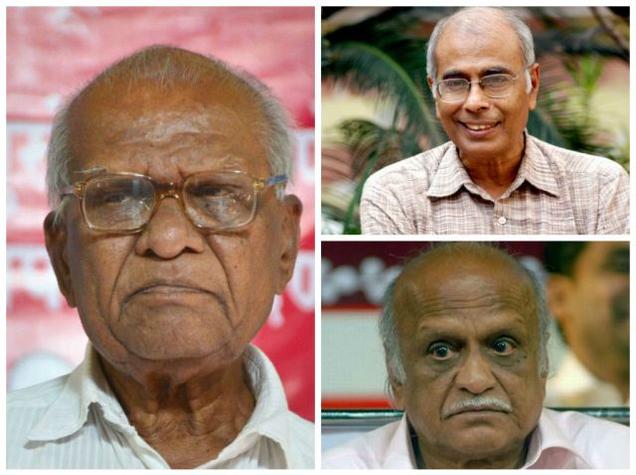India: The Shrinking Space Of Freedom To Criticise
By Mohd Intekhab Alam Khan
19 October, 2015
Countercurrents.org

A series of unpleasant events in different parts of India in the recent past has drawn severe condemnation from all quarters; be it the media, the film fraternity, the political class, or the educated masses. And the latest to join the dissenting voice against the growing intolerance and insensitivity are the academicians and writers.
Unlike the often manifested Hindu-Muslim violent clashes that were product of enmity or hatred towards each other the recent spate of killings of eminent personalities was the upshot of the voices against the rising intolerant behaviour or the irrational cultural traditions. For instance, Narendra Dhabolkar was killed in cold blood for advocating against superstitious practices in Maharasthra; MM Kalburgi for writing against idol worship by Hnidus; and Govind Pansare who was suspected to be killed over his remarks against Nathuram Godse in a lecture at Shivaji University, Kolhapur, in January this year.
A unique pattern is palpable in the events that lead to the killings of the aforementioned personalities: the inability to absorb criticism of irrational practices or ideologies by the rightists or the hyper nationalists. This emerging trend is akin to the events that take place more often than not in our neighbouring countries Bangladesh and Pakistan where there is hardly any space for public dissent.
Shrinking public space: a reality in India?
Going by a few incidents of intolerant conduct, it would be naive to jump to a conclusion if not wrong altogether. Nevertheless indecent reactions by supporters of a particular ideology on social media platforms are indicating to the gradual undermining of the rights to free speech and subsequent constraining of space for disagreement. In an increasing intolerant milieu, any criticism to right wing politics is dealt with expression of harsh repugnance on Twitter or Facebook.
For instance, criticism of anything remotely connected to Hindu right wing ideology is being harshly, or sometimes, violently opposed. The moment one makes any remarks against the policies of current government or the Prime Minister, he or she faces a barrage of hate comments or direct abuses. And mind you! No one is spared irrespective of whether you are a Bollywood superstar, a celebrated journalist, or a respected academician.
Since Narendra Modi is considered as an infallible character by millions of people, and someone who is being revered as messiah possessing universal panacea for all ills, any disapproval of what he says and does is welcomed with extreme abhorrence. The current mood is partially similar to that of Nazi Germany where dissent was dealt with iron hand.
Social media trolling and the trend of posting hate comments started, more prominently, a few months preceding the Lok Sabha Elections last year. The BJP and its allies launched a massive online campaign against the then government led by the Congress. The elections are now over but the trend continues to be in vogue.
The same trend can be deduced from the uproar over the dissenting academicians and writers by the BJP leaders and its supporters. The lynching of a man over rumours of beef-eating in Dadri proved to be a tipping point in the series of events against which the writers and academic community were voicing their concerns. The brutal murder of Mohammad Akhlaq opened the floodgates of public condemnation of the central government, and more specifically, the Prime Minister over his “long silence”. That unfortunate incident prompted Nayantra Sahgal and later on, Ashok Vajpeyi, to return their Sahitya Akademi Samman to the government. Since that day many recipients of the prestigious award have returned their honours causing much embarrassment to the NDA government.
Instead of acting sane and discovering ways to resolve the current impasse, the BJP cabinet ministers are incessantly making more irresponsible and distasteful comments about the writers’ choice of returning their honours. Several ministers have dismissed the acts by merely branding as “politically motivated”. Mr. Arun Jaitley, a senior cabinet minister, has attributed the dissent of writers as “manufactured” to which Sahgal has responded succinctly in the words, “Why Arun Jaitley is so rattled?”
By terming the academicians’ decisions as political the BJP and its supporters are trying to implicate Congress, or perhaps, the Left parties in the current imbroglio. The underlying inference is that the Congress party is resorting to all means to derail government’s agenda of development and good governance. But the reasoning or argument of the ministers or the government per se is just a red herring to deflect from the larger issue at hand.
Intolerance to competing ideologies and systematic cramping of public space is on the rise in the country. The civil society must act swiftly and sternly to uphold the values for which India stands; otherwise the country will be pushed towards more intolerance and religious bigotry, which will result in further compression of the free public sphere.
Mohd Intekhab Alam Khan is a research scholar at Nelson Mandela Centre for Peace and Conflict Resolution, Jamia Millia Islamia, New Delhi.


